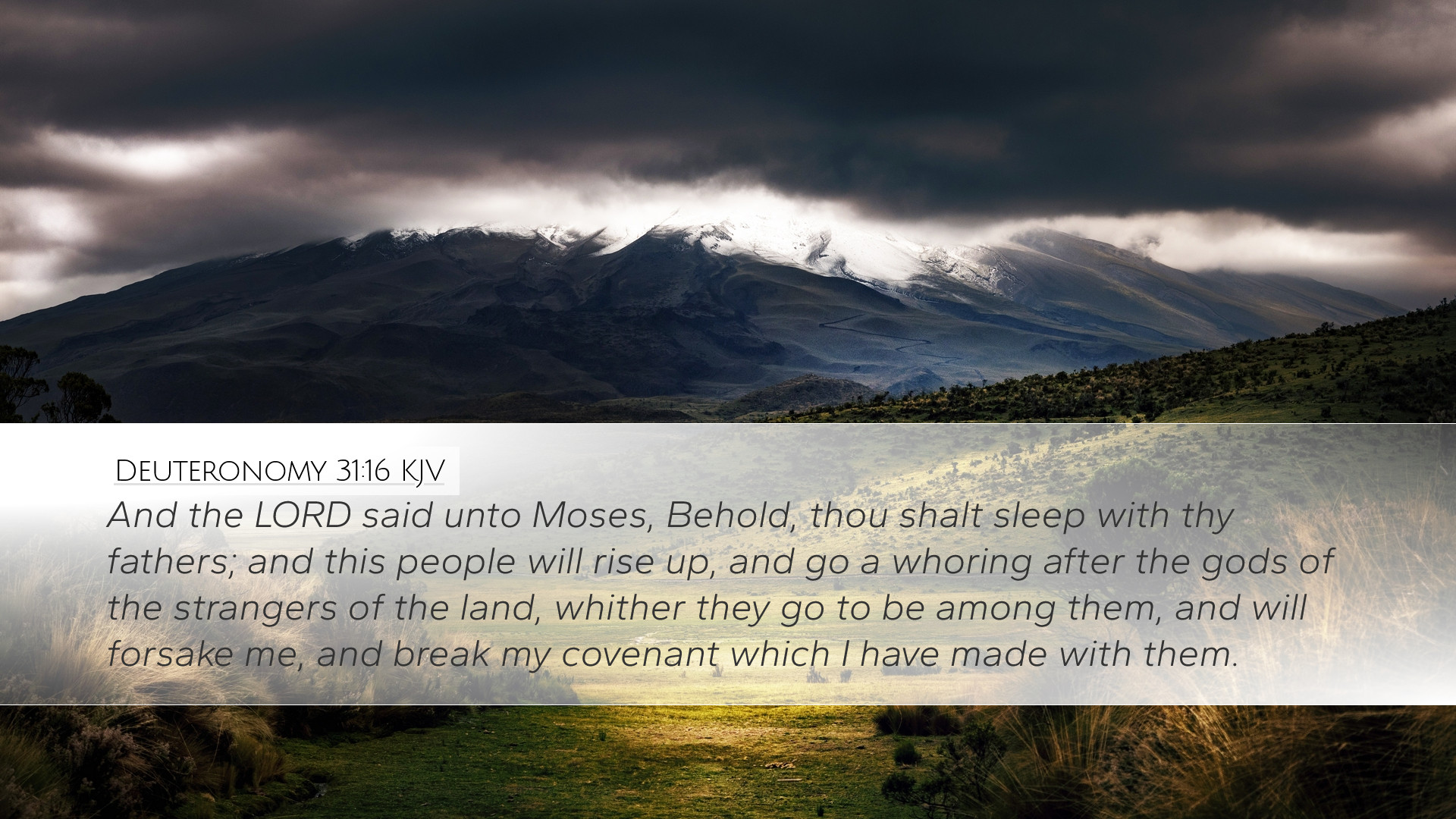Commentary on Deuteronomy 31:16
Verse Reference: Deuteronomy 31:16 - "And the LORD said unto Moses, Behold, thou shalt sleep with thy fathers; and this people will rise up, and go a whoring after the gods of the strangers of the land, whither they go to be among them, and will forsake me, and break my covenant which I have made with them."
Introduction
This verse serves as a pivotal point in the transition of leadership from Moses to Joshua, while foreshadowing the potential apostasy of the Israelites. It reflects the relationship between God and His people, emphasizing the seriousness of covenant fidelity and the inherent propensity of humanity towards idolatry.
Theological Significance
Moses’ Role: As Moses prepares for his impending death, God communicates a prophetic warning concerning Israel's future behavior after his departure. This interaction underscores Moses' significant leadership and his unique standing as mediator between God and His people.
The Nature of Idolatry: The phrase "go a whoring after the gods of the strangers" vividly conveys the idea of spiritual unfaithfulness. Idol worship is depicted as an act of infidelity against God, emphasizing the covenant relationship established at Sinai. Both Henry and Clarke highlight how this idolatry constitutes a betrayal, likening it to marital unfaithfulness.
Insights from Matthew Henry
Matthew Henry notes that this prophetic declaration from the Lord serves to remind the leaders and the people of the seriousness of their covenant with God. He expounds on the consequences of forsaking God, which would not only lead to national decline but also personal and spiritual repercussions. Henry emphasizes that the Israelites' future idolatry reflects a recurrent theme in biblical history— the struggle between faithfulness to God and the temptations of the surrounding cultures.
Albert Barnes’ Interpretation
Albert Barnes elaborates on the historical context of this prediction. He perceives this warning as an acknowledgment of the inevitable decline that would follow Moses' death. Barnes explains that the 'strangers of the land' represent the pagan nations that would corrupt Israel's loyalty to God. He underscores that this anticipated rebellion demonstrates humanity's continuous struggle against the allure of sin and idolatry.
Adam Clarke’s Exposition
Adam Clarke enriches the commentary by providing insights into the cultural implications of this passage. He articulates that the spiritual infidelity mentioned is not merely an act of worship but encompasses a broader social and moral decline. Clarke stresses the importance of guarding against external influences and the necessity for vigilance in maintaining one's covenant relationship with God. His exposition calls attention to the responsibilities of leadership to guide the people towards faithfulness.
Covenantal Themes
This verse encapsulates key themes of the covenant in the Old Testament. The covenant between God and Israel was monotheistic, demanding loyalty to Yahweh alone. The warning serves as a reminder that the blessings of the covenant are contingent upon adherence to God's statutes and prohibitions against idolatry.
- Covenant Faithfulness: The need for fidelity to God is a fundamental expectation placed upon the Israelites.
- Prophetic Warning: God's foreknowledge is apparent in His warning, demonstrating His sovereignty and intimate concern for His people.
- Consequences of Apostasy: The prediction of rebellion and forsaking the covenant highlights the dire consequences immigrants and settled nations faced when deviating from God’s path.
Application for Today
The lessons derived from Deuteronomy 31:16 extend beyond historical context, offering contemporary relevance. For pastors, students, and scholars, the themes of loyalty, leadership, and the perils of cultural integration present profound challenges and opportunities for application in today’s world.
Pastoral Implications
Ministers are called to shepherd their congregations in maintaining fidelity to God amidst secular influences. This involves not only teaching sound doctrine but also emphasizing the importance of communal worship and individual discipleship.
Academic Considerations
Theologically, scholars are urged to analyze the nature of idolatry in modern contexts, examining how contemporary 'gods'— such as materialism, individualism, and secularism— may infiltrate the church.
Personal Reflection
Individuals are invited to examine their own lives for areas of compromise. Increased awareness of how cultural influences can sway devotion to God is essential for spiritual growth and covenantal fidelity.
Conclusion
Deuteronomy 31:16 serves as a powerful reminder of the necessity for vigilance in our covenant relationship with God. With prophetic foresight, the Lord warns of the susceptibility to idolatry, urging His people to remain steadfast in faith. As we reflect on the insights provided by esteemed commentators and the historical context, we are called to renew our commitment to uphold God's principles in our lives and communities.


